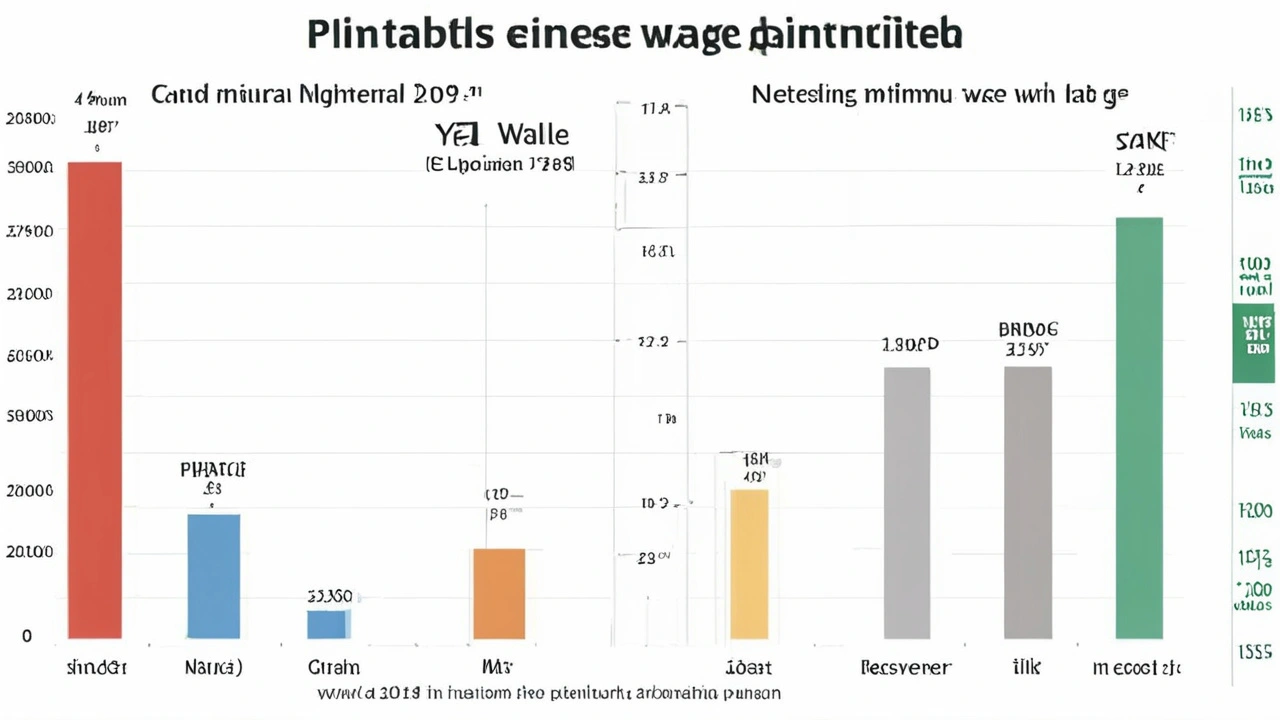Rising Costs of Labour Demands
The ongoing debate over Nigeria's minimum wage has taken a dramatic turn, with the organised labour pushing for an increase that could potentially cost the federal government an additional N85 billion every month. This issue is gaining traction as the high cost of living continues to plague workers across the nation. The pressure on the government to revise the minimum wage escalates, bringing about contentious discussions between labour unions and the federal administration.
Current Wage and Unions' Proposal
At present, Nigeria's minimum wage stands at N30,000. However, the labour unions, under the leadership of prominent figures like Ajaero and Osifo, are advocating for an astronomical increase to N615,000. This 20-fold increment, they argue, is necessary to align with the exorbitant living expenses faced by the average Nigerian worker today. Food and transportation costs have surged, eating into the workers' earnings and leaving minimal room for savings or investments.
While the proposal for a higher minimum wage aims to improve the quality of life for workers, the financial implications for the government are significant. According to insights from SBM Intel, accommodating this demand would almost double the government's annual personnel costs, from N7 trillion to an estimated N11 trillion. This increase is substantial and could strain the national budget to a breaking point.
Government's Counterproposal
In response to the unions' demands, the federal government has proposed a counteroffer of raising the minimum wage to N48,000. This figure, while reflective of a willingness to adjust, pales in comparison to the unions' expectation of N615,000. The government's proposal incorporates considerations of budgetary constraints and aims to mitigate any extreme disruptions that a sudden, massive wage hike could cause.
However, the need for a common ground seems urgent as both parties persist in their stances. Experts suggest that any resolution will likely necessitate a supplementary budget to ensure compatibility with the nation’s financial capabilities. The standoff highlights a deeper issue—whether a focus on minimum wage alone is sufficient in addressing the broader economic challenges faced by Nigerian workers.
The Push for a Living Wage
Economic experts are increasingly advocating for a shift from the traditional minimum wage discussions to a more comprehensive concept: the living wage. A living wage considers multiple factors beyond the base salary, such as affordability of essential services, productivity levels, and inflation rates. By addressing these aspects, the aim is to establish a more holistic approach to wage adjustments that could offer sustainable solutions for both workers and the government.
Historically, the minimum wage has often failed to keep up with inflation and living costs, rendering wage increases insufficient shortly after implementation. The current push from labour unions underscores the pressing need to reassess how wages are calculated and revised. By adopting the living wage concept, policies could better accommodate the economic realities faced by workers, leading to more effective and long-term improvements in living standards.
Impact on Future Budgets
The International Monetary Fund (IMF) has issued cautionary notes regarding the financial implications of the proposed wage adjustments. It has observed that the negotiated wage amounts could surpass the figures accounted for in the original 2024 budget, calling into question the sustainability of such amendments. This underscores the necessity for careful financial planning and the potential requirement of re-negotiating and restructuring the budget to manage these demands effectively.
As discussions progress, the need for a balanced approach becomes evident. Striking a balance between meeting the demands of the labour unions and maintaining fiscal responsibility will be crucial for the federal government. The implications extend beyond immediate personnel costs, affecting overall economic stability and growth.
Looking Ahead
As Nigeria navigates this critical juncture in its economic policy, the entire country watches closely. The outcome of these negotiations will set a precedent for future wage discussions and economic planning. It remains to be seen how the government and labour unions will reconcile their differences and what compromises will shape the future of Nigeria’s workforce. The pursuit of a living wage may indeed offer a path forward, one that aligns more closely with the aspirations and needs of the nation's workers while ensuring economic viability.
This ongoing debate is more than a tug-of-war over numbers; it is a defining moment that could reshape the financial landscape for years to come. With careful negotiation and forward-thinking policies, there is hope for a resolution that honors the hard work of the Nigerian people while safeguarding the nation's economic health.







Mayur Sutar
July 11, 2024 AT 19:10It's heartening to see the conversation around a living wage gaining traction. When policies reflect the real cost of food and transport, workers can finally breathe easier. A balanced approach that considers both fiscal health and human dignity is essential. The unions' push highlights genuine concerns that deserve thoughtful dialogue. Hopefully the government can find a middle ground that lifts livelihoods without destabilising the budget.
Nancy Ortiz
July 14, 2024 AT 02:43Ah, the classic dialectic of macro‑fiscal prudence versus micro‑labor economics-utterly riveting. One might argue that adjusting the nominal wage index to align with the consumer price elasticity vector is a mere formality. Yet the omnibus budget recalibration, replete with sovereign debt servicing constraints, renders such idealistic projections somewhat quixotic. In the grand tableau of fiscal heterodoxy, perhaps a modest uplift suffices to appease the proletarian sentimentality. Nonetheless, the hyperbolic N615k proposition is, frankly, a fiscal fantasy.
Ashish Saroj( A.S )
July 16, 2024 AT 10:17Honestly-this whole wage saga is just another episode of governmental indecisiveness!!! Why not just triple the minimum wage and watch the economy implode? It's not like budgetary constraints are real-just a convenient excuse!!! Surely the unions want to bankrupt the nation, right???
Ayan Kumar
July 19, 2024 AT 21:37Listen up, folks-this is not some petty squabble over a paycheck, it's a seismic shift in the nation's socio‑economic fabric! The labor unions have meticulously dissected the cost‑of‑living indices, and trust me, their calculations are spot‑on. Meanwhile, the government is playing it safe, tossing around half‑baked figures like a child with a toy calculator. If we keep dancing around the numbers, we'll never get to the crescendo of a fair living wage. So, buckle up, because the drama is only just beginning.
Nitin Jadvav
July 22, 2024 AT 05:10Alright team, let's break this down like a workout plan-easy reps, heavy lifts, and a lot of sweat. Sure, a jump to N615k sounds like lifting a truck, but maybe start with the N48k as a warm‑up set. Remember, progress isn’t about leaping over the bar, it's about steady reps. Keep the morale high, keep the budget in check, and maybe someone will actually enjoy the gains.
Adrish Sinha
July 23, 2024 AT 22:50Every worker deserves a wage that covers basic needs.
Arun kumar Chinnadhurai
July 26, 2024 AT 20:17When we examine the wage discussion, it is crucial to separate the political rhetoric from the underlying economic fundamentals. First, the current minimum wage of N30,000 is far below the average monthly expenditure on food, housing, and transportation for most Nigerian households. According to recent CPI data, inflation has outpaced wage growth by nearly 12 % over the past year, eroding real purchasing power. Second, a modest increase to N48,000, as proposed by the government, would still leave many families below the poverty line, but it represents a step toward narrowing the gap. Third, the unions' demand for N615,000, while seemingly excessive, is rooted in a genuine need to cover the soaring cost of essential services. Fourth, implementing a living wage framework allows us to calculate compensation based on a basket of goods rather than an arbitrary figure. Fifth, such a framework can be calibrated annually to reflect changes in inflation, productivity, and sector‑specific conditions. Sixth, from a fiscal perspective, spreading the wage increase over multiple budget cycles can mitigate the shock to the national treasury. Seventh, the government could consider targeted subsidies for energy and transport to complement wage adjustments, easing the immediate burden on households. Eighth, public‑private partnerships can play a role in upskilling workers, boosting productivity and justifying higher wages in the long run. Ninth, transparent communication of the methodology behind wage calculations builds trust among stakeholders. Tenth, engaging civil society and labor experts early in the process ensures that the policy is both realistic and socially acceptable. Eleventh, a phased implementation-starting with a 10 % increase and reviewing outcomes-provides valuable data for future adjustments. Twelfth, monitoring mechanisms must be established to track the impact on employment, inflation, and government expenditure. Thirteenth, lessons can be drawn from neighboring economies that have successfully adopted living wage policies without destabilising their budgets. Fourteenth, a balanced approach that respects both workers' dignity and fiscal sustainability is not only possible but essential for sustained growth. Finally, by adopting a holistic, data‑driven strategy, Nigeria can set a precedent for equitable economic development that benefits everyone.
Aayush Sarda
July 29, 2024 AT 03:50Esteemed colleagues, while the inclusive framework presented is commendable, it is imperative to remember that Nigeria's sovereignty must not be compromised by external economic prescriptions. The nation's fiscal autonomy should guide any wage policy, ensuring that foreign debt obligations are not jeopardised. Moreover, a balanced approach must safeguard national security interests, particularly in the energy sector, where excessive wage inflations could undermine strategic initiatives. It is therefore advisable to align wage reforms with a robust, home‑grown economic strategy that prioritises the interests of our great nation.
Mohit Gupta
July 31, 2024 AT 11:23Wow... another lecture on patriotism while workers struggle to put food on the table!!! It's like caring about the budget more than human lives!!! Seriously, get real.